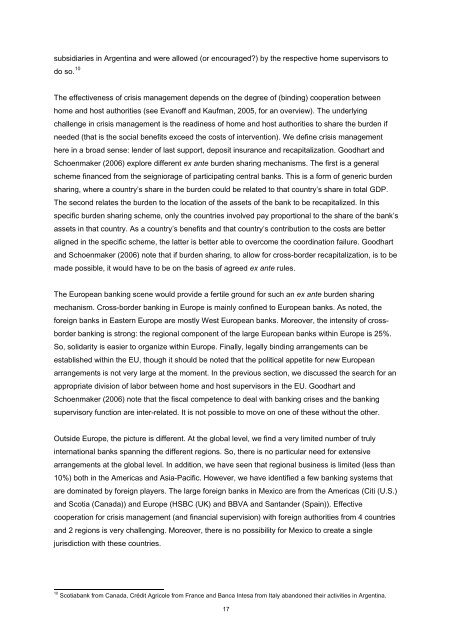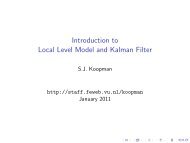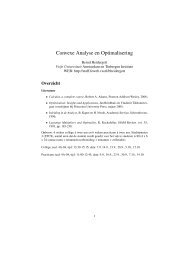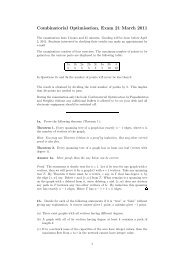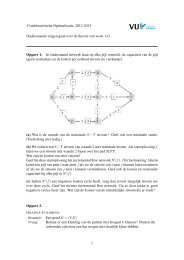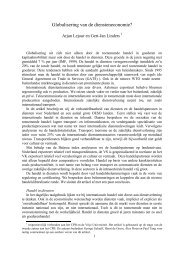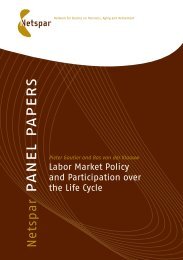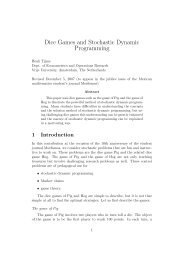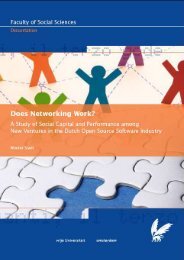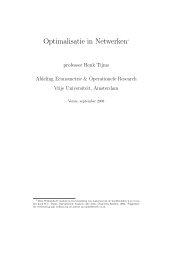Current State of Cross-Border Banking - Vrije Universiteit Amsterdam
Current State of Cross-Border Banking - Vrije Universiteit Amsterdam
Current State of Cross-Border Banking - Vrije Universiteit Amsterdam
You also want an ePaper? Increase the reach of your titles
YUMPU automatically turns print PDFs into web optimized ePapers that Google loves.
subsidiaries in Argentina and were allowed (or encouraged?) by the respective home supervisors to<br />
do so. 10<br />
The effectiveness <strong>of</strong> crisis management depends on the degree <strong>of</strong> (binding) cooperation between<br />
home and host authorities (see Evan<strong>of</strong>f and Kaufman, 2005, for an overview). The underlying<br />
challenge in crisis management is the readiness <strong>of</strong> home and host authorities to share the burden if<br />
needed (that is the social benefits exceed the costs <strong>of</strong> intervention). We define crisis management<br />
here in a broad sense: lender <strong>of</strong> last support, deposit insurance and recapitalization. Goodhart and<br />
Schoenmaker (2006) explore different ex ante burden sharing mechanisms. The first is a general<br />
scheme financed from the seigniorage <strong>of</strong> participating central banks. This is a form <strong>of</strong> generic burden<br />
sharing, where a country’s share in the burden could be related to that country’s share in total GDP.<br />
The second relates the burden to the location <strong>of</strong> the assets <strong>of</strong> the bank to be recapitalized. In this<br />
specific burden sharing scheme, only the countries involved pay proportional to the share <strong>of</strong> the bank’s<br />
assets in that country. As a country’s benefits and that country’s contribution to the costs are better<br />
aligned in the specific scheme, the latter is better able to overcome the coordination failure. Goodhart<br />
and Schoenmaker (2006) note that if burden sharing, to allow for cross-border recapitalization, is to be<br />
made possible, it would have to be on the basis <strong>of</strong> agreed ex ante rules.<br />
The European banking scene would provide a fertile ground for such an ex ante burden sharing<br />
mechanism. <strong>Cross</strong>-border banking in Europe is mainly confined to European banks. As noted, the<br />
foreign banks in Eastern Europe are mostly West European banks. Moreover, the intensity <strong>of</strong> crossborder<br />
banking is strong: the regional component <strong>of</strong> the large European banks within Europe is 25%.<br />
So, solidarity is easier to organize within Europe. Finally, legally binding arrangements can be<br />
established within the EU, though it should be noted that the political appetite for new European<br />
arrangements is not very large at the moment. In the previous section, we discussed the search for an<br />
appropriate division <strong>of</strong> labor between home and host supervisors in the EU. Goodhart and<br />
Schoenmaker (2006) note that the fiscal competence to deal with banking crises and the banking<br />
supervisory function are inter-related. It is not possible to move on one <strong>of</strong> these without the other.<br />
Outside Europe, the picture is different. At the global level, we find a very limited number <strong>of</strong> truly<br />
international banks spanning the different regions. So, there is no particular need for extensive<br />
arrangements at the global level. In addition, we have seen that regional business is limited (less than<br />
10%) both in the Americas and Asia-Pacific. However, we have identified a few banking systems that<br />
are dominated by foreign players. The large foreign banks in Mexico are from the Americas (Citi (U.S.)<br />
and Scotia (Canada)) and Europe (HSBC (UK) and BBVA and Santander (Spain)). Effective<br />
cooperation for crisis management (and financial supervision) with foreign authorities from 4 countries<br />
and 2 regions is very challenging. Moreover, there is no possibility for Mexico to create a single<br />
jurisdiction with these countries.<br />
10 Scotiabank from Canada, Crédit Agricole from France and Banca Intesa from Italy abandoned their activities in Argentina.<br />
17


